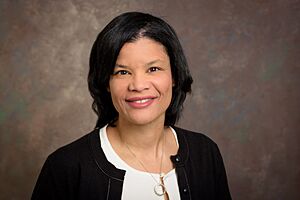LaShanda Korley facts for kids
Quick facts for kids
LaShanda Teresa James Korley
|
|
|---|---|
 |
|
| Alma mater | Georgia Tech Clark Atlanta University Massachusetts Institute of Technology |
| Scientific career | |
| Institutions | University of Delaware Case Western Reserve University Massachusetts Institute of Technology |
| Thesis | PEO-containing Copolymers as Polyurethane Soft Segments in the Development of High Performance Materials (2005) |
| Doctoral advisor | Paula T. Hammond |
LaShanda Teresa James Korley is a top professor of materials science at the University of Delaware. She is an expert in materials like polymers, which are large molecules made of many small repeating units. She also studies soft matter, which includes things like gels and liquids.
Professor Korley is also working on big ideas to stop plastic waste from ending up in landfills and oceans. She helps turn old plastic into new, more valuable products. This process is called upcycling. She leads important research centers like the Center for Plastics Innovation. She also works with the Center for Research in Soft Matter and Polymers and the Center for Hybrid, Active, and Responsive Materials (CHARM). In 2019, she received the Lloyd N. Ferguson Young Scientist Award for her excellent research.
Contents
Early Life and Education
LaShanda Korley knew she wanted to teach from a very young age. When she was six, she would give her grandmother tests she made. She even taught classes using a toy blackboard.
She studied chemistry at Clark Atlanta University and finished in 1998. The next year, in 1999, she earned her bachelor's degree in chemical engineering from Georgia Tech. She chose chemical engineering because she loved physics, chemistry, and math.
After that, Korley went to the Massachusetts Institute of Technology (MIT) for her advanced studies. There, she focused on polymer science and technology. She worked with Professor Paula T. Hammond to study the properties of materials called polyurethanes. She earned her doctorate degree in 2005. After MIT, she joined Cornell University as a special research fellow.
Research and Career Highlights
In 2007, Professor Korley became a professor at Case Western Reserve University. Her research focuses on biomimicry, which means designing new materials by getting ideas from nature. She studied materials that change shape with moisture, like some plants do. She also worked on special gels and materials made from tiny protein pieces. Her lab at Case Western Reserve was called M-cubed, which stood for "mechanically enhanced, multi-functional materials."
She also led a research center for the National Science Foundation that studied layered polymer systems. In 2011, she was chosen for a special engineering symposium. This allowed her to work with engineering groups in the United Kingdom and China. In 2013, she received an important grant for her work in engineering and science.
Professor Korley returned to Massachusetts Institute of Technology in 2015 as a visiting scholar. While there, she worked on 3D-printed materials that could be changed using light. She also found ways to make polymers stronger by changing how their different parts were mixed.
Joining the University of Delaware
In 2018, Professor Korley became a distinguished professor at the University of Delaware. At the University of Delaware, she leads a big international research project for the National Science Foundation. She has studied the amazing structures of sea cucumbers and caddisfly silk. She also looked at the extracellular matrix, which is like the "glue" that holds cells together in living things. Her goal is to design new materials for things like soft robots, food packaging, and coatings that resist scratches.
In 2020, she was chosen to be a Fellow of the American Institute for Medical and Biological Engineering (AIMBE). This is a very high honor for engineers who work in medicine and biology.
Professor Korley also helps lead the University of Delaware Future Faculty Workshop. This workshop helps prepare new professors. She also co-directs the Center for Hybrid, Active, and Responsive Materials. This center guides important research into new materials. In 2021, she started working with Professor Thomas Epps III. They are finding new ways to use chemistry to turn old plastics into valuable, high-performance materials.
In January 2023, Professor Korley was chosen as a U.S. Science Envoy. This means she works with other countries to build stronger relationships through science. She helps create partnerships and improve teamwork between the United States and other nations.
Awards and Honors
Professor Korley has received many important awards for her work:
- 2023: Fellow of the American Chemical Society
- 2022: Fellow of the American Physical Society
- 2020: American Institute for Medical and Biological Engineering (AIMBE) Fellow
- 2019: NOBCChE Lloyd N. Ferguson Young Scientist Award
- 2011: DuPont Young Professor Award
Selected Publications
- Van de Voorde, K.; Pokorski, J. P.; and Korley, L.T.J.; "Exploring Morphological Effects on the Mechanics of Blended PLA/PCL Extruded Fibers Fabricated using Multilayer Coextrusion," Macromolecules 2020, doi:10.1021/acs.macromol.0c00289
- M. Chen et al., "Living Additive Manufacturing: Transformation of Parent Gels into Diversely Functionalized Daughter Gels Made Possible by Visible Light Photoredox Catalysis," ACS Cent. Sci., vol. 3, no. 2, pp. 124–134, Jan. 2017, doi: 10.1021/acscentsci.6b00335.
- R. S. Waletzko, L. T. J. Korley, B. D. Pate, E. L. Thomas, and P. T. Hammond, "Role of Increased Crystallinity in Deformation-Induced Structure of Segmented Thermoplastic Polyurethane Elastomers with PEO and PEO−PPO−PEO Soft Segments and HDI Hard Segments," Macromolecules, vol. 42, no. 6, pp. 2041–2053, Mar. 2009, doi: 10.1021/ma8022052
- L. T. J. Korley, B. D. Pate, E. L. Thomas, and P. T. Hammond, "Effect of the degree of soft and hard segment ordering on the morphology and mechanical behavior of semicrystalline segmented polyurethanes," Polymer, vol. 47, no. 9, pp. 3073–3082, Apr. 2006, doi: 10.1016/j.polymer.2006.02.093.
See also
 In Spanish: LaShanda Korley para niños
In Spanish: LaShanda Korley para niños
 | Valerie Thomas |
 | Frederick McKinley Jones |
 | George Edward Alcorn Jr. |
 | Thomas Mensah |

